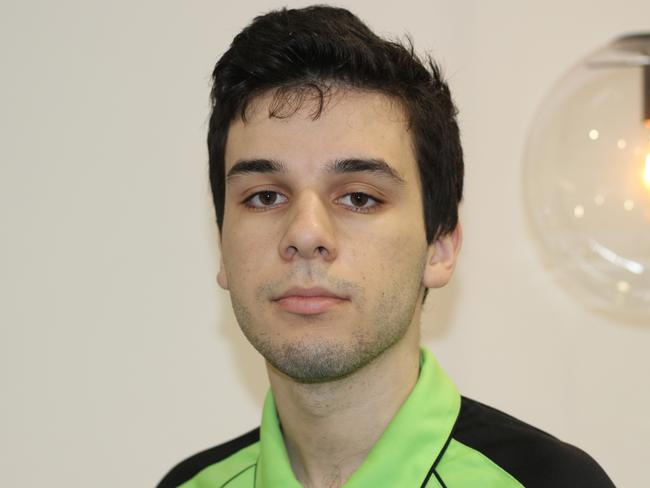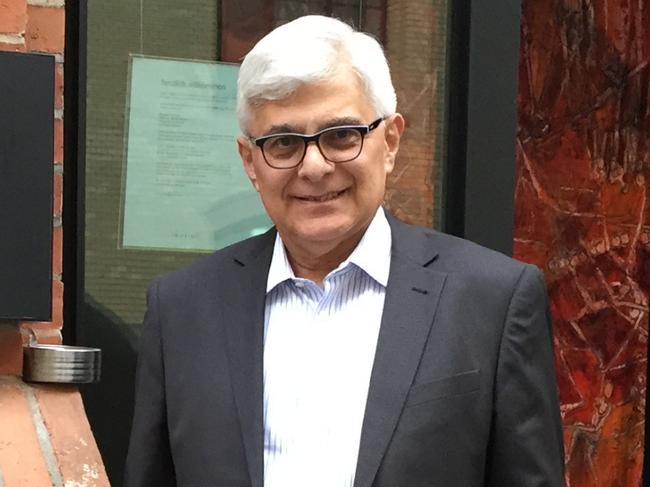Calls for anaesthetic drug to be reviewed after young man dies
A senior anaesthetist has called for a review of the drug Sugammadex after the death of Lucas Peyret, 21, following a routine surgery to remove his appendix. But the authorities are passing the buck.
NSW
Don't miss out on the headlines from NSW. Followed categories will be added to My News.
- ‘Suspect’ drug linked to 21-year-old Sydney man’s death
- Foetus ‘thrown out’ after miscarriage nightmare
A senior anaesthetic specialist has called on NSW Health to urgently review the increasing use of the drug Sugammadex in public hospitals following the death of 21-year-old Lucas Peyret.
But the authorities are passing the buck, as both NSW Health Minister Brad Hazzard and his federal counterpart Greg Hunt say that the drug’s use is the responsibility of the Therapeutic Goods Administration. This is despite a dramatic increase in Sugammadex use in public hospitals, funded by Mr Hazzard and Mr Hunt.
Meanwhile the TGA washed its hands of the issue, saying: “Given these drugs are used only by anaesthetists, who are aware of their possible adverse effects, the TGA is not considering issuing additional warnings.” Katya Denomme said she was very disappointed no one would take responsibility for her son Lucas’s death.

NSW Health refuses to acknowledge the drug may be at fault, despite the TGA listing her son’s death as an adverse event to Sugammadex.
“It is very disappointing, it could happen to their family member and then they will be the ones crying,” Ms Denomme said.
“We have to do something. I am still waiting for the hospital to communicate or take responsibility.”
Dr Michael Levitt, a medico-legal consultant and anaesthetist on the NSW Committee of the Australian Society of Anaesthetists, said the increasing use “needs to be reviewed”.
He said he had witnessed a patient go into respiratory arrest after having an anaphylactic shock and standard therapy did not work to revive her.
“It is in a class of drugs called cyclodextrans which are associated with a higher rate of anaphylaxis,” Dr Levitt said.

Dr Levitt’s call comes after a Sunday Telegraph investigation into the death of Mr Peyret. He had a routine appendectomy at Prince of Wales Hospital in May but deteriorated within a minute of receiving Sugammadex, a drug that quickly reverses neuromuscular blocking drugs used in general anaesthesia.
“It’s a great drug but it is used far too much,” Dr Levitt said.
“The drug works very well and it has definite indications and in certain situations it can be lifesaving, but occasionally you have a reaction like that (of Mr Peyret’s).”
MORE FROM JANE HANSEN:
‘Kids will look at her funny, but she is just like them’
Breast cancer survivors bare all in desperate plea
The NSW Therapeutic Advisory Group, NSWTAG, investigated the increased use in NSW hospitals in 2018.
Liverpool Hospital admitted “reversal (of anaesthesia) can be achieved over a much shorter time — everything is driven by length of stay and moving patients through quickly”.
Port Macquarie and Kempsey Hospitals reported “the figures look good if Sugammadex is used” and nd Tamworth Hospital reported “use had escalated rapidly due to ‘perceptions’ that Sugammadex use permitted ‘increased throughput’ in theatres”.
South East Sydney Local Health District, SESLHD, where Prince of Wales is based, reported “a greater than ten-fold increase in use over 3 years”. SESLHD also negotiated a lower price with pharmaceutical company, Merck Sharp & Dohme.

Dr Levitt said public hospitals now have cheaper access to the drug.
“In private hospitals it is still usually locked up and you have to request it but in the public hospitals … it is in the anaesthetic trolley and people just use it because it is there,” he said.
Dr Levitt’s first experience of anaphylaxis with the drug was with Kellyville’s Lindy Williams, who was just having a cyst drained from her ovary.
“I had a bronchospasm three minutes after the drug, I started to puff up and I went into respiratory arrest for 45 minutes,” the 49-year-old said.
“They said I was one minute off cardiac arrest. I have long-term effects following insufficient oxygen for too long, and from the aggressive treatment required to save me.

“I had no idea it had been increasing in usage. I went cold when I read Lucas’s story, it was devastating and what my family nearly went through.”
Dr Levitt said it was a narrow escape.
“We gave adrenaline intravenously with no response. What I did in the end was get an ampoule of adrenaline and poured it down her endo-tracheal tube and it worked. That probably saved Lindy’s life, but that is not in the literature, it’s not textbook.
“I think Sugammadex should be treated like narcotics and locked up and you have to request it and fill out a form to justify using it, and that is what we do in private hospitals.”

Dr Nigel Robertson, chair of the Australian and New Zealand College of Anaesthetists Quality and Safety Committee, said: ‘The college takes reports of adverse outcomes … very seriously and reviews the evidence … as to whether advice or guidance to anaesthetists is required regarding the use of particular drugs in anaesthesia practice.
“ANZCA considers issuing advisory notices to anaesthetists in response to (TGA) alerts and publications and also in response to information received directly from medicine or device manufacturers and the findings of coronial investigations.”
Originally published as Calls for anaesthetic drug to be reviewed after young man dies


